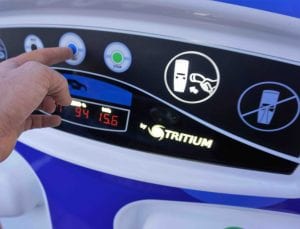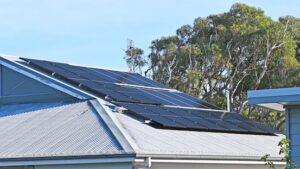Elon Musk has had enough.
On Tuesday delivered what is already being described as one of the biggest “burns” in the stock market, after announcing plans to take Tesla private, sending investors into a frenzy and lighting a fire under the stock before it was suspended from trade.
Am considering taking Tesla private at $420. Funding secured.
— Elon Musk (@elonmusk) August 7, 2018
Musk tweeted earlier on Wednesday that he was “considering taking Tesla private at $US420. Funding secured” and later releasing an email explaining his actions.
The motivation seems primarily to deal with the “shorts” or short sellers, which has become an industry of its own when related to Tesla. Some $US11 billion of money is at stake by investors betting that Tesla will fail, or the stock will collapse.
They bark at and criticise , creating Facebook and twitter accounts which launch never-ending tirades against Musk and the Tesla products.
At $US420 a shares Musk is valuing Tesla, which makes electric vehicles, battery storage for homes and at utility scale, rooftop solar and “solar tiles” at some $US72 billion ($A97.4 billion). Musk owns about 20 per cent of the company so taking it private would cost him more than $US50 billion if he bought all the stock.
But he says that’s not his plan. He is also inviting shareholders to go private with him.
My hope is *all* current investors remain with Tesla even if we’re private. Would create special purpose fund enabling anyone to stay with Tesla. Already do this with Fidelity’s SpaceX investment.
— Elon Musk (@elonmusk) August 7, 2018
“Def no forced sales,” he tweeted. “Hope all shareholders remain. Will be way smoother & less disruptive as a private company. Ends negative propaganda from shorts.”
“I own about 20% of the company now, and I don’t envision that being substantially different after any deal is completed,” Musk said in a later email to employees, sent several hours after his first tweet.
“Basically, I’m trying to accomplish an outcome where Tesla can operate at its best, free from as much distraction and short-term thinking as possible, and where there is as little change for all of our investors, including all of our employees, as possible.”
The comments lit a fire under the stock. According to NBC, some 30.4 million shares traded hands on Tuesday, the stock’s most active day since February 2014. The stock closed up 11 percent at $US379.57.
Musk said a final decision has not been made – and it is true that it would require shareholder approval, and confirmation of that financing he says he has in place.
“As a public company, we are subject to wild swings in our stock price that can be a major distraction for everyone working at Tesla, all of whom are shareholders.
“Being public also subjects us to the quarterly earnings cycle that puts enormous pressure on Tesla to make decisions that may be right for a given quarter, but not necessarily right for the long-term.
“Finally, as the most shorted stock in the history of the stock market, being public means that there are large numbers of people who have the incentive to attack the company.”
Good luck! Hope you pull this one off, will be another notch in your belt of achieving the impossible – biggest and meanest delisting in the history of mankind! You rock @elonmusk pic.twitter.com/ucK0JXkPeX
— Nikolay Zhukovsky (@nikolayz19) August 7, 2018
Musk caused some controversy in May when he became frustrated with analysts questions at the quarterly conference call and earnings presentations, describing some of them as “boneheaded” and boring. He had previously joked in a Tweet on April 1 that the company was going bankrupt.
A more patient Musk fronted the latest earnings call last Thursday, when he said that the company was on the verge of delivering “sustainable” profits as the production of the Model 3 ramped up. That more positive outlook helped boost the stock by 16 per cent over subsequent days.
Certainly, for most Tesla watchers, the hour long question and answers offer a fascinating insight into his plans.
Musk is not shy of publicity, and has 22 million followers on Twitter. But he likes to be in control of the messaging and Tesla employees and senior executives are barred from speaking on the record.
“I fundamentally believe that we are at our best when everyone is focused on executing, when we can remain focused on our long-term mission, and when there are not perverse incentives for people to try to harm what we’re all trying to achieve,” he wrote in his email to employees.
“This is especially true for a company like Tesla that has a long-term, forward-looking mission. SpaceX is a perfect example: it is far more operationally efficient, and that is largely due to the fact that it is privately held.
“This is not to say that it will make sense for Tesla to be private over the long-term. In the future, once Tesla enters a phase of slower, more predictable growth, it will likely make sense to return to the public markets.”
Still, while the stock surged, many analysts warned of the unconventional nature of the Tweet and email, and the potential repercussions if Musk did not – as advertised – have financing in place for the proposal.
In an article on Bloomberg, one analyst said the actions of Musk during the day – flagging the potential privatisation move first in a tweet and then in a blog, and without any filings to the stock exchange – highlighted why the company should not be publicly traded.
“The manner in which Elon Musk disclosed on Tuesday afternoon that he was “considering taking Tesla private” shows why this would be the best possible outcome for all involved,” Liam Denning wrote.
“Is Musk serious? Who knows, but telegraphing your takeout price while you’re only “considering” things is, well, unorthodox.”










